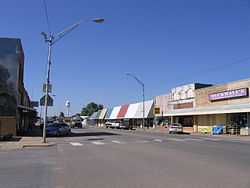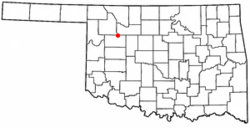Seiling, Oklahoma
| Seiling, Oklahoma | |
|---|---|
| City | |
 | |
 | |
| Coordinates: 36°09′06″N 98°55′31″W / 36.1515478°N 98.9253171°WCoordinates: 36°09′06″N 98°55′31″W / 36.1515478°N 98.9253171°W | |
| Country | United States |
| State | Oklahoma |
| County | Dewey |
| Area | |
| • Total | 0.822762 sq mi (2.130943 km2) |
| • Land | 0.822762 sq mi (2.130943 km2) |
| • Water | 0.0 sq mi (0.0 km2) |
| Elevation | 1,749 ft (533 m) |
| Population (2010) | |
| • Total | 860 |
| • Density | 1,000/sq mi (400/km2) |
| Time zone | Central (CST) (UTC-6) |
| • Summer (DST) | CDT (UTC-5) |
| ZIP code | 73663 |
| Area code(s) | 580 |
| FIPS code | 40-66250[1] |
| GNIS feature ID | 1097902[2] |
Seiling is a city in Dewey County, Oklahoma, United States. The population was 860 at the 2010 census. The town was named in 1899 for Louis Seiling, a local store owner who had acquired a homestead in the Cheyenne-Arapaho land run of April 1892. The Hobson Town and Improvement Company established a town called Hobson, but the name was changed to Seiling in January 1899. It incorporated in 1909. Seiling is now the largest city in Dewey County.[3]
History
Seiling developed as a local agricultural center and became the largest town in Dewey County despite the fact that the nearest railroad depot was in Canton, more than 25 miles (40 km) away . Moreover, there were no bridges across either of the Canadian rivers until 1906. A horse racing track was built in 1903.[3]
Geography
Seiling is located at 36°8′55″N 98°55′30″W / 36.14861°N 98.92500°W (36.148579, -98.925123)[4]. It is immediately south of the North Canadian River and 7 miles (11 km) north of the Canadian River, 10 miles (16 km) from Taloga, the county seat.[3]
According to the United States Census Bureau, the city has a total area of 0.8 square miles (2.1 km2), all of it land.
Demographics
| Historical population | |||
|---|---|---|---|
| Census | Pop. | %± | |
| 1910 | 352 | ||
| 1920 | 323 | −8.2% | |
| 1930 | 568 | 75.9% | |
| 1940 | 629 | 10.7% | |
| 1970 | 1,033 | ||
| 2000 | 875 | ||
| 2010 | 860 | −1.7% | |
As of the 2010 census, there were 860 people, 325 households, and 216 families residing in the city.[5] The population density was 1,000 people per square mile (400/km²). There were 402 housing units at an average density of 488.6 per square mile (786.3/km²). Residents self-identified as 95.1% white, 12.7% Native American, 4.9% of mixed heritage, 1.6% Asian, and 0.1% African American.[5] Hispanic or Latino Americans made up 3.7% of the population.[5]
There were 325 households out of which 29.5% had children under the age of 18 living with them, 48.9% were married couples living together, 12% had a female householder with no husband present, and 33.5% were non-families.[5] Individuals living alone accounted for 31.1% of households.[5] The average household size was 2.58 and the average family size was 3.24.[5] The median age was 37.9 years.[5]
The median income for a household in the city was $45,650, and the median income for a family was $58,466.[6] Males who were employed full-time had a median income of $43,333. Females who were employed full-time had a median income of $32,500.[6] The per capita income for the city was $24,410.[6] Below the poverty line were 9.7% of people, 10.3% of families, 13% of those under 18 and 11.6% of those over 64.[6]
Economy
The local economy has been based on agriculture since the land was opened to non-Indian settlement. The major crops initially were broomcorn and cotton. Seiling soon had a cotton gin and a feed mill. Wheat and rye became important crops before World War I. In 1918, the Seiling Milling Company opened a flour mill and marketed "White Rose Special" flour until it closed in 1952.[3]
Notable people
- Gary England (1939 -), TV personality (Meteorologist KWTV-News 9)
- Carrie Nation, Prohibition advocate.
References
- ↑ "American FactFinder". United States Census Bureau. Retrieved 2008-01-31.
- ↑ "US Board on Geographic Names". United States Geological Survey. 2007-10-25. Retrieved 2008-01-31.
- ↑ 3.0 3.1 3.2 3.3 Everett, Dianna. Encyclopedia of Oklahoma History and Culture. "Seiling." Retrieved September 18, 2013.
- ↑ "US Gazetteer files: 2010, 2000, and 1990". United States Census Bureau. 2011-02-12. Retrieved 2011-04-23.
- ↑ 5.0 5.1 5.2 5.3 5.4 5.5 5.6 U.S. Census Bureau, 2010 Demographic Profile Data for Seiling city, Oklahoma at American FactFinder (accessed September 19, 2013)
- ↑ 6.0 6.1 6.2 6.3 U.S. Census Bureau, 2007-2011 American Community Survey, accessed via American FactFinder database search of Seiling city, Oklahoma on September 19, 2013.
| |||||||||||||||||
